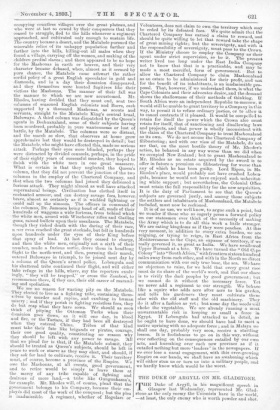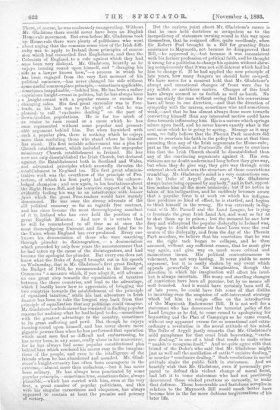THE DUKE OF ARGYLL ON MR. GLADSTONE.
THE Duke of Argyll, in his magnificent speech in Glasgow last Wednesday, represented Mr. Glad- stone as the only enemy the Unionists have in the world, —at least, the only enemy who is worth powder and shot. There, of course, he was moderately exaggerating. Without Mr. Gladstone there would never have been an English Home-rule movement. But oven before Mr. Gladstone took up Home-rule there were plenty of politicians who went • about urging that the common-sense view of the Irish diffi- culty was to apply to Ireland those principles of conces- sion which had reconciled first Englishmen, and then the „ Colonists. of England, to a rule against which they had once been very disloyal. Mr. Gladstone, heartily as he enjoys turning round upon himself, and " changing his •• side as a lawyer knows how,"—a process in which he has been engaged from the very first moment of his political eminence,—has never changed his side without some useful commonplace principle,—sometimes applicable, sometimes inapplicable,—behind him. He has been a rather capricious knight-errant in politics, but ho has always been , a knight-errant with a popular reason or excuse for , changing, sides. His first great surrender was to Free- , trade, as his last was to the right of what he was • pleased to call "exclusive dealing" on the part of down-trodden populations. He is far too much of an orator to turn round on a cause which he has once represented without some popular and present- able argument behind him. But when furnished with such a popular plea, there is nothing which he enjoys more than confuting those who stand where he himself has steed. His first notable achievement was a plea for Qhurch establishment, which included even the unpopular miseionary Church establishment in Ireland. He has now not, only disestablished the Irish Church, but declared against the Establishment both in Scotland and Wales, and advocated principles which avowedly threaten the establishment in England too. His first great adminis- trative work was the overthrow of the principle of Pro- , tection, of which his first party had been the acknow- ledged champion ; and now again, in his hesitations about the Eight. Hours Bill, and his tentative support of it, he is evidently feeling his way to an interference with Wittier fcfire which the great Free-traders would have warmly denounced. He was once the strong advocate of the old political economy so far as regards free contract, and has since become the most thoroughgoing assailant of it in Ireland who has ever held the position of a great English Minister. And now it is certain that he will be remembered to all time as at once the most thoroughgoing Unionist and the most fatal foe to the Union whom England has ever produced. Every one knows his denunciation of those who were marching through plunder to disintegration, — a denunciation which preceded by only four years the announcement that he had taken up the cause of the disintegrators, and had become the apologist for plUnder. But every one does not know what the Duke of Argyll brought out in his speech on Wednesday, that in Mr. dladstone's first great Budget, the Budget of 1853, he recommended to the House of Commons " a measure which, if you adopt it, will advance is one great step towards the equalisation of taxation between the three countries, and lead to the advantage, which I hardly know how to appreciate, of brigging the two countries towards the establishment of the principle of equalised taxation," while his last adventure in Irish finance has been to take the longest step back from that principle of equalisation that any politician could imagine. Mr. Gladstone's whole career has consisted in finding popular reasons for undoing what he had helped to do,—sometimes with the greatest advantage to the country, sometimes to its great suffering and peril. But though he enjoys turning round upon himself, and has never shown more gigantic powers than when he has performed that operation which most men find so difficult and embarrassing, he has never been, in any sense, really alone in his manoeuvre, for he has always had some popular constitutional plea behind him which rendered his access easy to the imagina- tions of the people, and even to the intelligence of the friends whom he has abandoned and assailed. Mr. Glad- stone's knight-errantry has often been courageous in the extreme,—almost more than audacious,—but it has never been solitary. He has always been penetrated by some popular principle,—sometimes true, sometimes false, always plausible,—which has carried with him, even at the very first, a great number of popular politicians, and this with his singular earnestness and eloquence, has always appeared to contain at least the promise and potency of victory. But the curious point about Mr. Gladstone's career is that he once held doctrines so scrupulous as to the inexpediency of statesmen turning round in this way upon themselves, that he resigned office, quite needlessly, when Sir Robert Peel brought in a Bill for granting State assistance to Maynooth, not because he disapproved that Bill,—he approved it,—but because it was inconsistent with his former profession of political faith, and he thought it wrong for a politician to change his opinion without show- ing conspicuously that it was not self-interest which had led him to change it. If he had applied the new principle of late years, how many dangers we should have escaped. We have never for a moment held that Mr. Gladstone's abrupt and sensational changes of front were due to any selfish or ambitious motive. Charges of this kind have always seemed to us foolish as well as harsh. No one can study the man without seeing that his conversions have all been in one direction,—and that the direction of sympathy with the masses, sometimes wise and sometimes weak,—and that he has almost always done more towards converting himself than any interested motive could have done towards influencing him. }Ilis is a nature which springs mines upon itself, and ho never knows exactly what is the next mine which he is going to spring. Strange as it may seem, we fully believe that the Phcenix Park murders did more to overturn his faith in the policy he was at that time pursuing than any of the Irish arguments for Home-rule ; just as the explosion at Pentonville did more to convince him that the Irish Church should be disestablished than any of the convincing arguments against it. His con- victions are no doubt undermined long before they give way, but when they do give way, they give way through some external shock which sets the structure of those convictions crumbling. Mr. Gladstone's mind is a very contentious one. As the Duke of Argyll justly says, " Mr. Gladstone always hates being opposed by anybody," and in fact, opposie tion makes him all the more tenacious ; but if no notice is taken of his indignation, and he suddenly becomes aware that a popular force is at work on which his indigna- tion produces no kind of effect, he is startled, and begins to think himself in the wrong. He was extremely in dig- nant with Mr. Parnell and the Land League, for trying to frustrate the great Irish Land Act, and went so far as to shut them up in prison ; but the moment ho saw how deep and widespread the popular disloyalty in Ireland was, he began to doubt whether the Land Laws were the real source of the disloyalty, and from the day of the Plicenix Park murders, we believe that his conviction that he was on the right tack began to collapse, and he then assumed, without any sufficient reason, that he must give way again, and give way on much more critical and momentous issues. His political contentiousness is vehement, but not very lasting. It never yields to mere argument, but it is easily shaken by any event which appeals powerfully to his imagination, though the direction in which his imagination will affect his intel- lect is always uncertain. His many and startling changes of conviction have been all genuine, but by no means all well founded. And it would have certainly been well if, of late years, he could have felt some of that dislike to incurring even the suspicion of self-interested strategy which led him to resign office on the introduction of the Maynooth Endowment Bill. It is not well for a statesman who has denounced the terrorist policy of the Land League as he did, to come round to apologising for boycotting and the Plan of Campaign as he came round, without any apparent excuse for so sensational and extra- ordinary a revolution in the moral attitude of his mind. The Duke of Argyll justly remarks that Mr. Gladstone's mild paraphrase for that cruel Irish boycotting, " exclu- sive dealing," is one of a kind that tends to make crime " unable to recognise itself." And we quite agree with that friend of the Duke's who said that Mr. Gladstone might just as well call the mutilation of cattle " excisive dealing," or murder " conclusive dealing." Such revolutions in moral attitude shake the public faith in statesmen. And we heartily wish that Mr. Gladstone, even if personally pre- pared to defend this violent change of moral front, had left it to some statesman who had not previously denounced these wicked practices so earnestly, to make that defence. Those honourable and fastidious scruples in relation to the Maynooth Bill would much better have become him in the far more dubious tergiversations of his later life.





















































 Previous page
Previous page